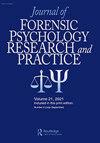Lessons Learned from Conducting Research with Prisoners Sentenced to Death and Their Families in India: Ethical Considerations and Methodological Challenges
IF 1.1
4区 心理学
Q4 CRIMINOLOGY & PENOLOGY
Journal of Forensic Psychology Research and Practice
Pub Date : 2021-03-28
DOI:10.1080/24732850.2021.1904808
引用次数: 1
Abstract
ABSTRACT Although ethical and methodological challenges of conducting research with vulnerable populations are widely acknowledged, there are fewer discussions on the unique difficulties encountered by researchers while working with prisoners sentenced to death and their families. This paper presents the reflective accounts of two researchers’ fieldwork experience, highlighting the ethical concerns and methodological challenges encountered while conducting an interdisciplinary research project on the mental health of prisoners sentenced to death and their families in India. Specifically, we discuss challenges faced during sampling of participants (prisoners and families), obtaining informed consent, confidentiality and right to anonymity, role confusion and conflict of interest, potential risks and benefits to research participants, and personal biases of researchers. We also provide suggestions for future researchers who wish to conduct research in this area and for policy makers to work toward minimizing the stigmatization and oppression faced by this community. Implications for research, clinical work, education, and training of mental health professionals are discussed.对印度死刑犯及其家属进行研究的经验教训:伦理考虑和方法挑战
虽然对弱势群体进行研究的伦理和方法挑战得到了广泛承认,但关于研究人员在研究死刑犯及其家属时遇到的独特困难的讨论却很少。本文介绍了两位研究人员实地工作经验的反思,突出了在开展关于印度死刑犯及其家属心理健康的跨学科研究项目时遇到的伦理问题和方法挑战。具体来说,我们讨论了在参与者(囚犯和家属)抽样过程中面临的挑战,获得知情同意,保密和匿名权,角色混淆和利益冲突,研究参与者的潜在风险和利益,以及研究人员的个人偏见。我们还为希望在这一领域开展研究的未来研究人员和政策制定者提供建议,以尽量减少该社区面临的污名化和压迫。对心理健康专业人员的研究、临床工作、教育和培训的影响进行了讨论。
本文章由计算机程序翻译,如有差异,请以英文原文为准。
求助全文
约1分钟内获得全文
求助全文
来源期刊
CiteScore
1.80
自引率
12.50%
发文量
53

 求助内容:
求助内容: 应助结果提醒方式:
应助结果提醒方式:


